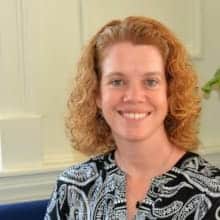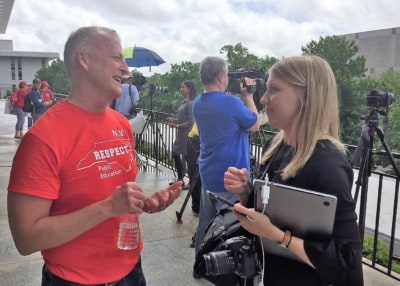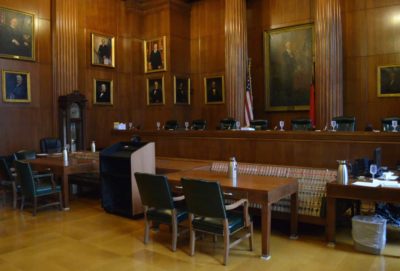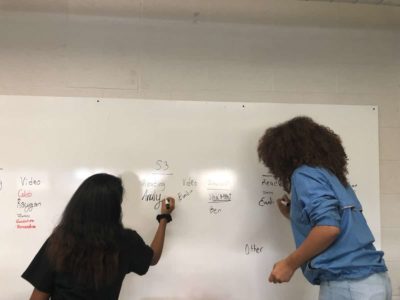In August, we visited the beginning teacher program in Caldwell County, co-lead by EdAmbassador Heather Puhl and two other mentors. Read that story here.
What do the following words have in common:
adventurous, tiring, exciting, busy, energizing, whirlwind, blessed.
These are some of the words that beginning teachers in Caldwell County have used to describe their first grading period of the 2018-19 school year.
Most adults spent a large portion of their childhood in a classroom environment to learn content and skills to help them be successful in life. When a person makes the transition from sitting in a student desk to fulfilling the role of a full-time teacher, he or she experiences a wide variety of emotions and challenges.
There is plentiful research to support the stages that beginning teachers experience. To begin the year, teachers are often in the “anticipation” stage in which they look forward to starting a teaching job and they spend time gathering materials in preparation for the first days of school. Once the school year begins, though, teachers quickly move into the “survival” stage. They are often overwhelmed with the realities of teaching and lesson planning, managing all of the paperwork, and they experience difficulty finding sufficient time to complete all that is required during a given day on the job.
As the year continues, beginning teachers often find themselves with feelings of frustration and in the “disillusionment” stage. During this period, beginning teachers internalize the expectations of being a teacher, but face new challenges like the lack of student performance, how to interact with parents, and being formally evaluated by an administrator.
However, once teachers are able to take time away from school to reflect on their progress, identify possible changes, and renew themselves personally, that teacher begins to enter the “rejuvenation” stage. This is when teachers see some of the success of their hard work, and, as a result, they create a renewed sense of purpose. This stage continues to carry a teacher through the remainder of the school year and causes reflective practice to become a regular part of a teachers’ routine.
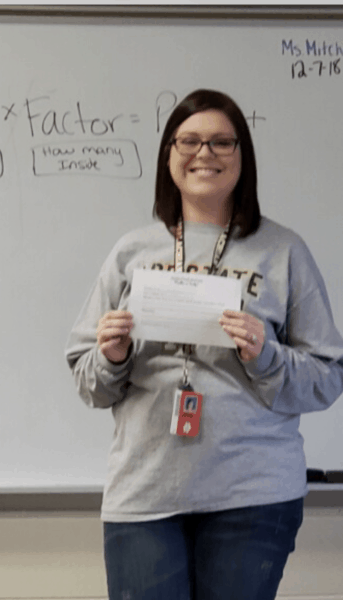

Being a teacher doesn’t mean coming to work at 8 a.m. and leaving by 3 p.m. each day, and it doesn’t mean simply being knowledgeable within a specific content area. It involves getting to know your students and what motivates them. It is about learning more about the environment that a child goes home to each afternoon in order to overcome any obstacles and help them to be successful. It requires a lot of planning time (both during and after-school hours) to create engaging lessons in ways that bring the curriculum to life in relevant ways.
It is about encouraging the development of the whole child by supporting students in extracurricular activities and by fostering appropriate relationships with them as well as with other adults who have a vested interest in their growth. It is about being a nurse, an advocate, a comedian, a counselor, a content specialist, a disciplinarian, and an encourager. Why would someone want to work so hard and fulfill so many roles? What is the reward?
The following quote from a Haley Mitchell, first-year teacher at Davenport Elementary, sums up why beginning teachers pour themselves into their work:
“The most rewarding moment I have experienced so far as a teacher would be having the kids come to school and not want to leave. They love being in the classroom, learning, and being in this safe place. It is a wonderful feeling to know that you are making a difference in their lives and impacting them in a positive way. We as teachers are the constant. They know we will always be there for them and that they can always rely on us.”
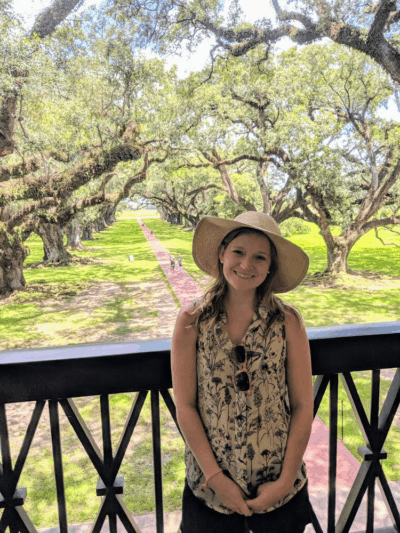

Rachael Welty, a third-year teacher at South Caldwell High School said,
“Some of the best moments I have had as a teacher had nothing to do with curriculum or content. The best moments are the ones in which I can be a trustworthy adult for kids who need one. I love building those relationships over time, and it is rewarding for me when the students know how proud of them I am.”
Another third-year teacher made these comments:
“We all have days that are rewarding, and then we have those days that we wonder if we could hit a redo button and start over! It could be that a lesson just flopped, or that a student had a difficult day, or it could be one of 1,000 other reasons. Reflection is a huge piece of the puzzle in a teachers success. If something didn’t go right, what could be approached differently next time? Where/what in my practice could I change to make my students more successful? I constantly seek for ways to make myself better, because when I become better, my students continue to grow.”
